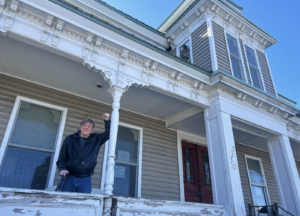Guest Author: Caleigh Charlebois
A tall pair of winter boots, fleece leggings, bed linens with two pillows, a bottle of Windex, a bag of dry milk and a box of cereal; these were the only things waiting for Tasmin Ikra when she arrived at her new apartment in Orono, Maine on Feb. 12 after sending the items ahead to her new roommate via an Amazon order only a few days before. She arrived past midnight after a 40-hour journey from Dhaka, Bangladesh, where the highest temperature the day of her departure had been 81 F, to Bangor, Maine, where it was now 8 F.
Tasmin Ikra is a graduate student researching electrical engineering under Mohamad Musavi, the associate dean of the College of Engineering at the University of Maine. She began the semester in Bangladesh before traveling to join the in-person campus community in early February.
In doing so, she left behind her parents, her boyfriend and the country she has called home for all 26 years of her life. Coming to the United States amid the COVID-19 pandemic also posed logistical challenges that wouldn’t have been present in previous years. The United States embassy in Dhaka, the capital of Bangladesh, was closed beginning March 19, 2020, delaying Ikra’s student visa application for months.
Despite these hardships, Ikra is one of 23 international graduate students who have made similar decisions to travel to UMaine this year, according to Orlina Boteva, director of the Office of International Programs. What has led them to leave their homes so far behind in order to pursue higher education in the United States?
In Ikra’s case, it is all about her desire to find an adviser that suits her professional goals. Working with Musavi will allow her to pursue research in her desired field: sustainable power systems.
“Climate change is felt very sharply in India, Bangladesh and the surrounding countries,” Ikra said. Her desire to travel to the U.S. for her Ph.D. is partially driven by her desire to make a real difference in a crisis threatening her home in Bangladesh.
While Ikra is confident that her time at UMaine will further her academic goals, the move has been disconcerting. She has lived in Dhaka, a busy, hot city whose winter weather is like Maine’s summer weather, for nearly her entire life.
She hadn’t heard the name “Orono” until she had already decided to enroll at UMaine. When she did, she had the impression that it was a small city such as Edinburgh, Scotland, which Ikra had visited once on a family trip.
“Here, something is different… I’m not saying it’s bad, but it is different,” she explained. “I was thinking that things will be much more available here.”
By “things,” she meant almost everything. There is very little within easy walking distance in Orono, especially for someone unaccustomed to the winter weather.
But in particular, Ikra worries about finding ingredients she used to cook with at home, such as cracked dried pulses she adds to rice. She hopes to find somewhere to buy them before she runs out of the supplies her mother packed for her.
It seems that her parents are what she will miss most about being away from Bangladesh. “I can cook because in my home, generally, I used to cook, but it’s difficult for me mentally to live alone, because I didn’t live at all without my family until now,” she shared.
“Maybe it’s weird here, but this is the tradition, that kids will live with their parents up to their marriage at least,” she paused before continuing. “I am emotionally attached to them so that’s how I am facing problems living alone. I think I will be okay with some time.”
This sentiment will be familiar to domestic students who have also struggled with leaving their families for the first time, but the distance between Ikra and her family, along with the cultural expectation that she should live with them into adulthood, has made it especially difficult.
Living in a new country also amplifies another common worry for Ikra; immersed in an unfamiliar culture, she worries about fitting in.
“The society, the people and the way people treat and greet each other… All things are different here,” Ikra says.
She laughed as she described her friends’ reaction to being invited inside her apartment after they brought her to the grocery store.
“In our country, if you have come to drop someone off, they will definitely let you into the house and offer you some food,” she said. “So I was just asking them if they want to come in, but they were telling me, ‘No, no, this is not Bangladesh so I won’t come in.’ So maybe I’m afraid that I’m doing something that is ill-mannered here in the U.S.”
Ikra elaborated on her concerns, also recognizing small cultural differences between regions of her own country.
“In my home region in Bangladesh, the custom is to give something in return when someone gives you a gift. But in the neighboring region close by, giving something back would not be the custom and someone would be upset. Neither person is wrong, it is just a matter of custom. But things are so different between even small regions there and now I am in a completely new country,” Ikra says.
Though Ikra has faced many surprises since her arrival in Orono, not all have been unwelcome. Among them was an unexpected sense of community.
“I had no idea that there would be so many Bangladeshi people here,” she remarks.
When Ikra decided to attend UMaine, she found a Facebook group for Bangladeshi students in Maine. Since arriving, she says she has met roughly three to four couples and single students from Bangladesh who know each other through the Facebook group. Most astonishingly, she did not know that one of her friends from her time in her undergraduate program in Bangladesh was also attending UMaine until she arrived here.
She described this coincidence in a pleasant tone that doesn’t convey as much surprise as one might expect. “When I arrived, I saw she was here as well and texted her, and she came over and took me to the store,” she said. “I hadn’t seen her since 2015.”











